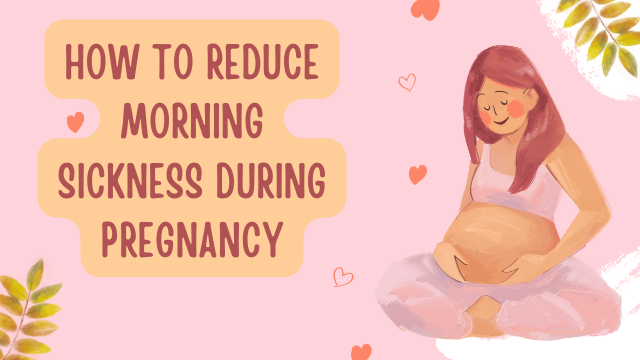
Nausea is a common issue when it comes to pregnancy. Especially for those in the first trimester. Nausea typically begins 2-4 weeks after the initial fertilization and can stick around for 22 weeks. But why is that? What is causing you to feel like you can’t eat without throwing up, or having “morning sickness?” How can you manage this at home, and when should I be getting concerned?
“MORNING SICKNESS”
This isn’t actually the best term. Most people think you have a little nausea in the beginning of the day, but then it goes away. That doesn’t seem to be the case in most people though. And by most, I mean 98% of people. Only 2% of pregnancies have nausea and vomiting that doesn’t persist throughout the day. However, people continue to use the term to describe nausea and vomiting in pregnancy (NVP). The reason this is happening in the first place is due to the changes being made in the body. Hormones that cause nausea are ramping up in order to support baby. Namely progesterone. After the first timester, the progesterone is changes how it is being produced, which allows the nausea to subside in most cases.
IT’S A GOOD SIGN
Hear me out. I’m sure it feels miserable. The silver lining you can take from the experience is that its coming from that shift of your hormones. This is a sign that things are working like they need to! Researchers have found a connection between those that have NVP and lower rates of miscarriage. You are in a majority with 70-80% of all pregnant women. Now, if you’re someone who hasn’t been experiencing that common sick-to-the-stomach feeling, don’t panic. It’s common to experience nausea when your hormones raise, but that isn’t true for every single person. Some people might only experience this if their hormones are SUPER high. Some might be experiencing Hyperemesis Gravidarum or have the NVP impact their quality of life.
HOW DO I MANAGE THIS MYSELF, DAY-TO-DAY?
There are some options! One heavily researched and used home remedies would be ginger products. Some people use little ginger candies or drink a ginger-infused tea. The ginger works to help regulate stomach function, support hormones, and is an anti-inflammatory. What that means for you is less nausea and enhanced ability to absorb nutrition from the food you eat. This also comes with considerably less side-effects than other non-natural anti-nausea supports.
Another thing to take a look at is your diet. How have you been eating lately? A diet full of processed sugars and fats is going to cause you more nausea. We recommend getting good protein and healthy fats in small doses. Eating little meals throughout the day will help with those feelings as well. Staying away from heavily spiced or spicy foods will keep the nausea from firing up.
WHEN DOES IT BECOME AN ISSUE?
One reason NVP becomes concerning, is when it is impacting the quality of life for the person experiencing it. The last thing we want is for these issues to be causing more stress and strain on the mindset or relationships of the pregnant patient. This can be overlooked a lot when it comes to your care, but are still very important. It is a magical time and we want you to be able to have the best experience possible.
HYPEREMESIS GRAVIDARUM?
This is a term that means “excess vomiting in pregnancy.” The main major distinction from NVP, is that its not going away like it should. When we talk about the typical nausea that a person might experience, that should subside around 20 weeks into the process. People with hyperemesis gravidarum are experiencing an extreme version of that. This is causing constant nausea AND constant vomiting that didn’t go away. This is concerning for several reasons:
• Dehydration – You are losing all of your fluids through vomiting. This is going to dry out your muscles and make your blood thicker. Cramps may happen along with blood pressure issues and lack of proper support for the health of baby.
• Electrolyte imbalance – Not being able to keep food and fluids down causes the electrolytes in your body to go out of balance. This stresses the kidneys and causes other organ problems. If severe enough, it could even cause seizures, coma, and/or pre-term delivery.
• Nutrition deficiency – This is also very concerning for you and for baby. You both need the nutrition from the food you are trying to eat in order to function at your best. In particular, we see a lot of B vitamin issues from the food not absorbing in the gut prior to being disposed of. This leads towards feeling lethargic and in pain. Your baby could experience complications during their growing process if you didn’t get proper nutrition throughout pregnancy.
If you think you might be experiencing any of this, you need pregnancy support. Contact your OB-GYN and/or midwife.
WHAT CAN CHIROPRACTIC DO TO HELP?
Chiropractic addresses how joints are working and how the nerves are communicating with the rest of the body. During pregnancy, all of the hormones start shifting and the stress of growing baby causes joints to not function properly. This causes interference with the nerves, which contributes to pain and nausea in pregnancy. Our safe and non-invasive treatment corrects the cause of that nerve interference and puts your body in the best possible position to do what it needs to do. What this means for you, is a comfortable and happy pregnancy. If you’re interested in support, give us a call at (573) 443-5900. We would love to chat about your concerns.

